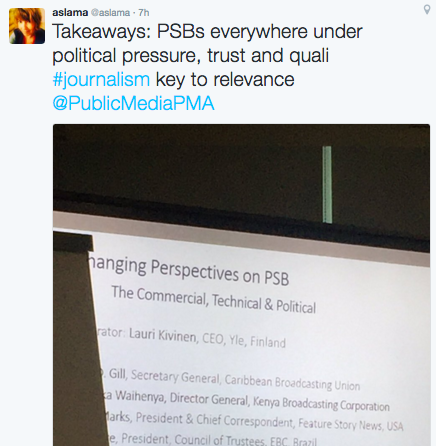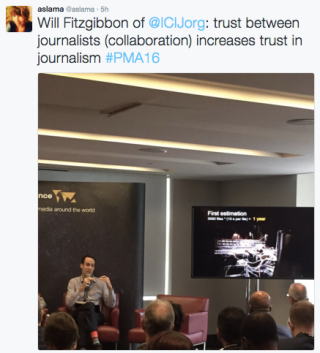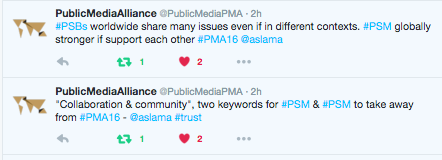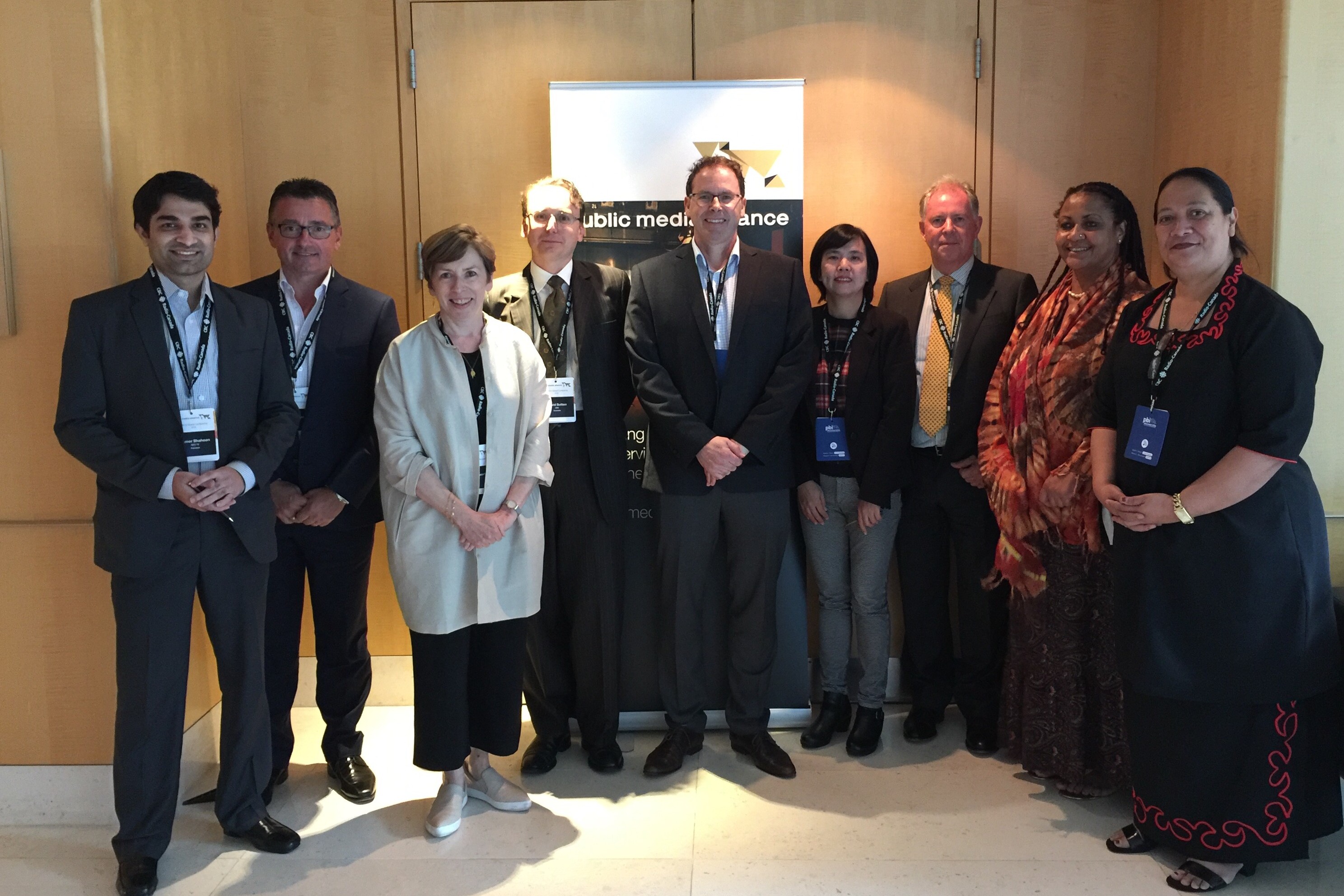From the need for greater collaboration to embracing the digital age, our conference rapporteur, Dr. Minna Aslama Horowitz, summarises the key statements and “take-aways” from PMA’s 2016 conference.
By Dr. Minna Aslama Horowitz.
The Public Media Alliance recently held its 2016 conference, #PMA16, in Montreal on 14 September.
Below are some of my take-aways:
1. Key Note #1 – Why ‘Public’ Media Matters in a Fragile World
Craig Hammer, Media Development, World Bank. He reiterated the often heard comments about the declining trust in media, and the weakening freedoms of expression, and safety of journalists: right now, perhaps more than ever, we need public media.
In addition, he noted that non-Western countries are leapfrogging and bypassing their mature PSM counterparts in rethinking the collaborative, participatory and curatorial, multiplatform models of PSM (e.g., Kenya & India).
Q&A: CH notes that developing stronger media systems in the Global South, and public media, is challenging as many funders seem not to understand the importance of media (systems, funding models). He’s calling for customisable models. One part of this equation is awareness raising among audiences about the importance of PSM.

2. Changing Perspectives on PSB: The Commercial, Technical and Political
Chair: CEO Lauri Kivinen of Yle, Finland; Sonia Gill of the Caribbean Broadcasting Union; Waithaka Waihenya of KBC, Kenya; Rita Freire, EBC, Brazil; Simon Marks of Feature Story News, USA.
- How do the panelists see the possibilities for transitions from state to true public service media?
WW: KBC used to be a feared entity, government’s loudspeaker -> “punishing” public media -> now the government much more sympathetic. But: let’s stop lamenting the funding issue, let’s accept and solve it.
RF: Political crisis: the gov’t withdrew autonomy of EBC but multistakeholder support to protect media.
LK: In the last 3 months Croatia, Hungary, Poland — these countries can’t overcome the paradox of PSM financed by the people but governed by the state. This paradox needs to be overcome to have a functioning PSM organisation. “We must bite the hand that feeds us”. It’s scary to hear about Brazil.
SG: We are seeing concerns about the arrest of reporters in the Caribbean. Highly commercialised media sector because gov’s couldn’t. Telecoms (Caribbean & foreign) are now becoming major media owners. How can we secure indigenous content? We continue to have the problem with CEOs of media houses with their political affiliations. Cybersecurity legislation has recently been used to regulate legacy media/journalism. Technology continues to be a challenge – how to guarantee universal access? E-waste a problem.
SM: One would think the US wouldn’t be a fragile state but I have begun to think so… The current election (coverage) is the tragic result of the lack of public media. References The Economist: “The Post-Truth Environment”. Technical: not an obstacle but a huge opportunity. E.g.: 1) Overhaul of culture in PSB: Content now specifically produced for different platforms. 2) Radio NZ Checkpoint: Multiplatform simulcast – redefining “broadcasting”. Decoding unit allows access to studios to deliver HDTV footage for multiplatform audiences = Major cost reductions.
- How can we make sure that PSB/PSM remains relevant?
SG: Involvement of civil society. The case of Brazil shows this clearly.
WW: Craig talked about trust as a rare commodity these days. News pushed through social networks, etc. Trust and journalistic quality are our commodity.
Q: To WW: What’s the status of KBC’s digital switchover? Q to all: Possibility of license fees as a funding model?
SG: Jamaican funding model is a success. Direct user fees won’t work.
LK: public support helps to build political support.
WW: Kenya fully digital. But as a result of a fierce war with comm broadcaster that wanted a piece of the pie. Decision: Digitalisation = a public project.
SM: On social media — you HAVE to go where the audiences are. Use the tech to build your brand of trust. How to modernise but maintain the quality?

3. Intervention: PMA Research Project
Sally-Ann Wilson, CEO, PMA: What do we need to know that we don’t from academic research and other sources? How do people who run PM organisations see their organisations? What are the key questions that keep them awake at night?
Created a PSM ‘pyramid’: Role -> Characteristics/Content -> Model
20 responses so far; very consistent regardless of the context!
Role: independency, inclusivity and diversity, building and reflecting national identity (providing media plurality in a globalising world wasn’t considered very important)
Characteristics: Independence, impartiality, trust (being popular wasn’t that important)
Content: Impartial news, international news (environmental coverage not so important)
PMA — we don’t merely talk, we act. The BBC model needs revision for other countries, but the changes in that model will shape other models.
Promotion of public media? How do we promote ourselves (and not only “preaching to the choir” — We need to leave the church and involve partners, and measure impact to increase credibility, matrix). We hope PMA can create an index of key performance indicators so we can learn.

4. Keynote #2 – Representing Citizens: Not Governments
Moderator: Paul Thompson, CEO of Radio New Zealand & President of PMA
Keynote: Fran Unsworth, BBC World Service
What should be the proper balance between politics and the media? If journalists are too powerful we can do damage,but too weak where’s the role?
Brexit — what to report? Should one report claims of both sides?
Even in the midst of the most heated debates, the BBC was applauded as the most balanced.
Threats to journalism and human rights are constant (e.g., Kashmir, Turkey, Kenya, Malaysia, Belarus, Ukraine, Russia, Uganda, China – exodus from newspapers & foreign journalists, Hungary, Vietnam, Iran…)
Too often govts trying to control. No total control — foreign investors a variety of that — so selective censorship.
Total free speech impossible. Who is the regulator, who sets the rules?
Amartya Sen: No famines in countries with free press.
EBU research: public media contributing to democracy (less extremism, more political participation).
The collapse of authoritarian regime doesn’t automatically mean press freedom; it may take a long time. Many regimes unwilling, perhaps fearful. That’s why our job is even more important.
Q: Is the trend now more than ever that when journalistic freedom is being threatened in legacy media they can push the stories in social media?
- Growth in authoritarianism
- State broadcasters parroting those in power
- Intermediaries are controlled as well, and filter bubbles that are created…
Changes of governance structure of the BBC… Profound implications re: the independence of the BBC.
Moderator: Sonia Gill, Ahmer Shaheen of GEO Pakistan, Mark Bassant of CCN Trinidad & Tobago, Will Fitzgibbon of Intl Consortium of Investigative Journalists
MB: Investigative journalism in a digital age is characterised by:
- Deadlines don’t exist
- Mobile news consumption
- Display for info, for easy access (visualisations, timelines?) is key
WF: Truth, Trust and the Digital Era — the Panama Papers — immense data leak — not possible without digital era. Trust can be seen in several ways: trust between journalists feeds into trust in journalism. Trust in data — collaborative verification. Trust in the public — make structured data available, open access. The RISKS to trust increase with digital era.
AS: Financial feasibility — longer, more resources, can get media shut down… So very expensive — invisible costs — especially in fragile states. “Pakistan a paradise for investigative journalism – organised corruption is rampant”.

6. Engaging the Digital Public
Tim Fenton, International Election Advisor:
- Journalism is the biz of making the significant interesting
- Journalists should either genuinely be thrive impartiality or admit bias
- The best-served audiences have both
Divide political reporters — parliament, politics, and elections.
A 3-minute summary
Back to the future and different… but oh so similar.
From both keynotes to this panel, throughout the panels:
- Politics — external influence
- Technology — reach
- Trust — relationship with audience
- Core mission — to provide access and to provide value, basic components diversity whether in political coverage as Namibian example… but also unity, as mentioned by the CEOs in the PMA study. And bring forth under-reported issues, such as John Mohmoh (CEO, Channels TV, Nigeria) highlighted, and certainly trustworthy coverage in the cases of crises, as Investigative Journalist Marion Warnica (CBC News) highlighted. Perhaps, as proven by the EBU research, support democratic practices. And tell great, engaging stories.
MDM: Mapping Digital Media 56 countries
Global PSM Experts Network: over 90 countries
We tackle with these challenges, just in new reiterations. And it seems that we are more alike than ever.
Last words from WW: let’s move on! Let’s thrive to be integral part of their lives — KBC
Conclusions:
- Possibilities of collaboration – geographical, global (Graig Hammer – models, examples)
- Institutional – PMA research shows common concerns
- Non-PSB partners – Simon Marks’ efforts/Feature Story News.
- Amongst journalists, for trust, for security. Or, amongst organisational leaders — The case of Brazil.
- With the public — branding, marketing, more collaboration.
And so back to the our first keynote that mentioned the new roles, or functions of PSBs, beyond broadcasting toward a collaborative, participatory and curatorial, multi-platform existence… Perhaps we add to the list: a mobilising agent for all these kinds of collaborations.
Our sincere thanks to Minna for writing such an extensive summary.
Dr. Minna Aslama Horowitz is a Professor in International Communication at St. John’s University, New York and manages the Global PSM Networks Network.
Sourced from Minna’s original article, found here.
Header image: Truth & Trust panel. Image: Kristian Porter/PMA




